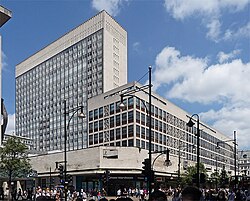London College of Fashion
 From Wikipedia - Reading time: 8 min
From Wikipedia - Reading time: 8 min
 London College of Fashion building in Stratford | |
| Established |
|
|---|---|
| Head | Andrew Teverson |
| Location | London , United Kingdom 51°32′30″N 0°00′46″W / 51.5418°N 0.01287°W |
| Affiliations | University of the Arts London |
| Website | arts |
 | |
 | |
The London College of Fashion is a constituent college of the University of the Arts London, a public art university in London, England. The college offers undergraduate and postgraduate study, short courses, study-abroad courses and business training in fashion and related topics. The patron is Sophie, Duchess of Edinburgh.[1] The current head of college is Professor Andrew Teverson.[2]
History
[edit]
The origins of the London College of Fashion are in three early London trade schools for women: the Shoreditch Technical Institute Girls School,[3] founded in 1906; the Barrett Street Trade School, founded in 1915; and the Clapham Trade School, founded in 1927. All were set up by the technical education board of the London County Council to train skilled labour for trades including dressmaking, millinery, embroidery, women's tailoring and hairdressing; to these, furriery and men's tailoring were later added. Graduates of the schools found work either in the garment factories of the East End, or in the skilled dressmaking and fashion shops of the West End of London.[4]
After the Second World War the minimum school leaving age was 15; junior level courses at the colleges were scrapped. Barrett Street Trade School became Barrett Street Technical College, and the Shoreditch and Clapham schools were merged to form Shoreditch College for the Garment Trades. Both had the status of technical colleges, and began to take male students also. In 1967 the two colleges were merged to form the London College for the Garment Trades. This was renamed London College of Fashion in 1974.[4]
In 1986 the London College of Fashion became part of the London Institute, which was formed by the Inner London Education Authority to bring together seven London art, design, fashion and media schools.[5] The London Institute became a legal entity in 1988, could award taught degrees from 1993, was granted University status in 2003 and was renamed University of the Arts London in 2004.[5]
In August 2000 Cordwainers College, a specialist school for leather-working, shoemaking and saddlery, was merged with the London College of Fashion. It was founded in Bethnal Green in 1887 as the Leather Trade School. The name was changed to Cordwainers Technical College in about 1914, and then to Cordwainers College in 1991.[6][7]
The college moved to Stratford in east London in 2023.[8][9]
It is one of six constituent colleges of the University of the Arts London, the others being Camberwell College of Arts, Central Saint Martins College of Art and Design, Chelsea College of Art and Design, London College of Communication and Wimbledon College of Art.[10]
Campus
[edit]
Until 2023, when it moved to new premises in Stratford, the main building was in John Prince's Street, just north of Oxford Circus, with other campuses at 272 High Holborn, 40 Lime Grove in Shepherd's Bush, and – in east London – 182 Mare Street, 100 Curtain Road and Golden Lane.[11]
The new building, at 105 Carpenters Road in the Queen Elizabeth Olympic Park in Stratford, was purpose-built to designs by Allies and Morrison, which were intended to reflect nineteenth-century mill buildings.[9][12]
Alumni
[edit]Among the alumni of the college are Jimmy Choo, shoe designer,[13] Ioana Ciolacu, fashion designer,[14] and Driss Jettou, former prime minister of Morocco.[15]
References
[edit]- ^ "The Countess of Wessex appointed patron of London College of Fashion". The Daily Telegraph. Archived from the original on 3 December 2013.
- ^ "Professor Roni Brown". 4 October 2021.
- ^ Sir James Bird, ed. (1922). "The Shoreditch Technical Institute". Survey of London: volume 8: Shoreditch. Institute of Historical Research. Retrieved 18 March 2013.
- ^ a b Julie Tancell (2002). GB 2159 London College of Fashion. AIM25: Archives in London and the M25 area. Retrieved May 2014.
- ^ a b [s.n.] (August 2012). University of the Arts London (formerly The London Institute) A Brief History Archived 10 November 2013 at the Wayback Machine University of the Arts London. Retrieved May 2014.
- ^ Julie Tancell (2002). GB 2159 Cordwainers. AIM25: Archives in London and the M25 area. Retrieved May 2014.
- ^ T.F.T. Baker, ed. (1995). "Hackney: Education". A History of the County of Middlesex: Volume 10: Hackney. Institute of Historical Research. Retrieved 18 March 2013.
- ^ "LCF Goes East". British Vogue. 7 June 2016. Retrieved 15 December 2020.
- ^ a b "Frequently Asked Questions". London College of Fashion. Retrieved 22 October 2023.
- ^ "London College of Fashion website".
- ^ Virtual Tours Archived 22 May 2014 at the Wayback Machine. University of the Arts London: London College of Fashion. Retrieved May 2014.
- ^ Mimi Francis-Mearns (8 June 2023). "Our Future in Stratford: Everything you need to know about East Bank".
- ^ Browse all alumni profiles. University of the Arts London: London College of Fashion. Retrieved May 2014.
- ^ "LCF Student wins Designer For Tomorrow". blogs.arts.ac.uk/. Archived from the original on 10 July 2013. Retrieved 4 July 2013.
- ^ Jettou, Driss (in French). Brussels: Institut Européen de Recherche sur la Coopération Méditerranéenne et Euro- Arabe (MEDEA). Retrieved April 2015.
 KSF
KSF